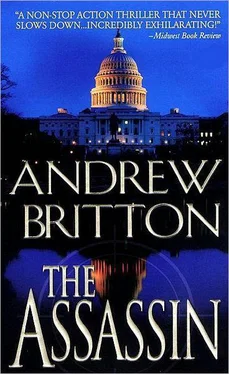Andrew Britton - The Assassin
Здесь есть возможность читать онлайн «Andrew Britton - The Assassin» весь текст электронной книги совершенно бесплатно (целиком полную версию без сокращений). В некоторых случаях можно слушать аудио, скачать через торрент в формате fb2 и присутствует краткое содержание. Жанр: Триллер, на английском языке. Описание произведения, (предисловие) а так же отзывы посетителей доступны на портале библиотеки ЛибКат.
- Название:The Assassin
- Автор:
- Жанр:
- Год:неизвестен
- ISBN:нет данных
- Рейтинг книги:3 / 5. Голосов: 1
-
Избранное:Добавить в избранное
- Отзывы:
-
Ваша оценка:
- 60
- 1
- 2
- 3
- 4
- 5
The Assassin: краткое содержание, описание и аннотация
Предлагаем к чтению аннотацию, описание, краткое содержание или предисловие (зависит от того, что написал сам автор книги «The Assassin»). Если вы не нашли необходимую информацию о книге — напишите в комментариях, мы постараемся отыскать её.
The Assassin — читать онлайн бесплатно полную книгу (весь текст) целиком
Ниже представлен текст книги, разбитый по страницам. Система сохранения места последней прочитанной страницы, позволяет с удобством читать онлайн бесплатно книгу «The Assassin», без необходимости каждый раз заново искать на чём Вы остановились. Поставьте закладку, и сможете в любой момент перейти на страницу, на которой закончили чтение.
Интервал:
Закладка:
None of it reminded him of the night she had died at Vanderveen’s hand, but that didn’t matter. It always came back in the end. It was the one thing from which he could not shake free.
After another few minutes, Kealey crossed the street and started up 6th, heading toward Chinatown. His thoughts were ever shifting, as were his feelings, but he could admit this: he had no desire to shake free. He needed the pain, and he needed the guilt. They served as constant reminders. Reminders of what he had done, what he had failed to do, and what he had lost.
He deserved nothing less.
The conference room on the eighth floor of Le Meridien Etoile was filled with a dull roar, which was perhaps inevitable when 250 of the world’s most prominent business leaders were pushed into the same confined space. From his seat on the left side of the room, Dr. Nasir al-Din Tabrizi could see a few familiar faces scattered throughout the crowd: the chief financial officer of Dow Chemical, a plump deputy chairman of Barclays Bank, and the new CEO of Lockheed-Martin, a petite, polished blonde who had graced the covers of both Fortune and Forbes the previous month.
Tabrizi smiled as he lifted a glass of water to his lips. He enjoyed these conferences, not only because they generated enormous opportunities, but because his country was finally in a position to profit from those opportunities. Iraq had floundered for so long; it was only fitting that she now had the chance to prosper. The worst had come after 1990, when the UN-imposed sanctions had devastated what was left of the country’s economy. Tabrizi had been in England when the Gulf War began, teaching at the London School of Economics, but he’d closely followed the news from home. Like many prominent Iraqis in London, he had been a member of the Iraqi National Congress, the leading opposition group outside Iraq. The only difference was that Tabrizi had been one of the very few Sunni Muslims involved with the organization.
The group was founded after the war and secretly funded for years by the CIA. Following the American invasion in 2003, many long-standing members of the INC had sought out leadership positions in the interim government, Tabrizi included. In this respect, his close association with Ahmed Chalabi, a presidential hopeful and one of the group’s leading members, had proved invaluable. In January of 2004, Tabrizi was awarded a modest position with the Iraqi Governing Council, the first government set up by the Coalition Provisional Authority. Since then, he’d hung on through a number of interim administrations, resulting in his recent appointment to the lofty post of foreign minister.
Nasir Tabrizi was deep in thought as the secretary-general of the International Chamber of Commerce made his way to the podium. Tubrizi’s feelings toward the United States were decidedly mixed. During his years in London, the INC’s murky relationship with the U.S. government had made him extremely uncomfortable. At the same time, that relationship was largely responsible for his current position. His country was even more divided than he was. A recent poll had suggested that more than 80 percent of Iraqis wanted American troops out of the country. Tabrizi understood the sentiment, but he knew that a rapid withdrawal would likely cause the new government to break down completely. At the moment, the only thing holding it together was international pressure for results, and as one would expect, most of that pressure was coming from the United States. The troops were a highly visible reminder of the U.S. commitment to the region, and while the nature of that commitment was cause for constant debate, no one could deny that the Americans were in for the long haul.
Of course, the current situation left much to be desired. The attempted assassination of Nuri al-Maliki had led to numerous outbreaks of violence over the past two weeks, particularly between Sunni insurgents and followers of the Shiite cleric Moqtadr al-Sadr. Since that failed attempt, 30 American soldiers had died in Baghdad alone. Tabrizi knew that the U.S. president’s approval ratings were at an all-time low, hovering around 40 percent. Richard Fiske, the Democratic challenger, had promised a rapid withdrawal of troops as part of his election campaign, and the American people seemed to be responding to that platform. Tabrizi worried constantly about what the results of that election might mean for his country, but unfortunately, all he could do was watch from the sidelines.
A noise behind him caused him to turn. A French security officer tapped the face of his watch and whispered so as not to interfere with the speech being given at the front of the room. “Ten minutes, Dr. Tabrizi.”
“Thank you.” He nodded cordially, and the man retreated. After arriving in Paris two days earlier with the Iraqi delegation, he’d been surprised to find that three CRS men had been assigned to his security detail. Like all senior officials in Iraq, he was provided with an armed escort whenever he left the Green Zone, but that kind of protection was rarely afforded by other nations, even during official visits. Knowing they could count on Tabrizi’s voice in the legislature, the Americans had most likely slipped a quiet word to the French. At least, that was what he assumed had happened. Despite the attack in Baghdad, he didn’t think the security was particularly necessary. Still, the presence of his young guardians was somewhat reassuring, even in a city as civilized as Paris.
The secretary-general concluded his remarks, and the room filled with applause. Rising from his seat, Tabrizi shook a few extended hands and exchanged some pleasantries, then turned to the CRS man. “The next meeting will not take long. I assume the car is outside?”
A brief nod. “Yes, sir. The convention center is right across the street. I’ll walk with you that far, and the car will take you on to your hotel afterward.”
“Wonderful.” The Iraqi physician smiled and gestured toward the door. “Lead the way.”
CHAPTER 23
WASHINGTON, D.C.,VIRGINIA,PARIS
The restaurant was located on the 700 block of 6th Street, just across from the recently renamed Verizon Center. It was hard to spot from the street, and Kealey walked past it several times before he finally inquired in a video shop, which happened to bear the correct address. The sullen clerk on duty wordlessly guided him out to the road and pointed toward the entrance, a covered staircase running up the side of the building. Making his way up to the second floor, he was greeted at the door by a pretty Chinese woman in a red silk dress. He followed her through the busy dining room to one of several smaller rooms in the back.
He found Jonathan Harper digging into a plate of chicken curry, a cup of steaming amber tea at his right hand. The woman handed Kealey a menu and departed, softly closing the door behind her. It was quiet inside the little alcove, the only sounds the clanking of plates from the adjacent dining area, low snatches of conversation, and the rain beating against a small frosted window.
Harper pointed to a chair and said, “What kept you? Christ, you’re soaked.”
“I felt like walking.”
“From where? McLean?”
Kealey poured some of the tea and looked down at his damp clothes. “I got caught in the downpour.”
There was a slight tap at the door, and the woman reappeared. She smiled demurely and handed him a towel. He was surprised but accepted it gratefully. Harper murmured a few words in Chinese, and the woman departed.
“This is a nice place,” Kealey remarked, working the towel through his hair. “How did you find it?”
“I know the owner. He’s Burmese, a former diplomat. I worked with him when I was attached to the State Department back in ’94. He liked the city so much he decided to stay. He bought this place when he retired. I don’t come here that often, but they seem to remember me.”
Читать дальшеИнтервал:
Закладка:
Похожие книги на «The Assassin»
Представляем Вашему вниманию похожие книги на «The Assassin» списком для выбора. Мы отобрали схожую по названию и смыслу литературу в надежде предоставить читателям больше вариантов отыскать новые, интересные, ещё непрочитанные произведения.
Обсуждение, отзывы о книге «The Assassin» и просто собственные мнения читателей. Оставьте ваши комментарии, напишите, что Вы думаете о произведении, его смысле или главных героях. Укажите что конкретно понравилось, а что нет, и почему Вы так считаете.












